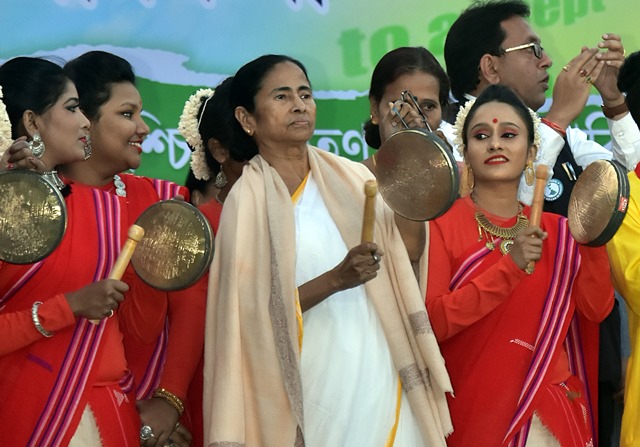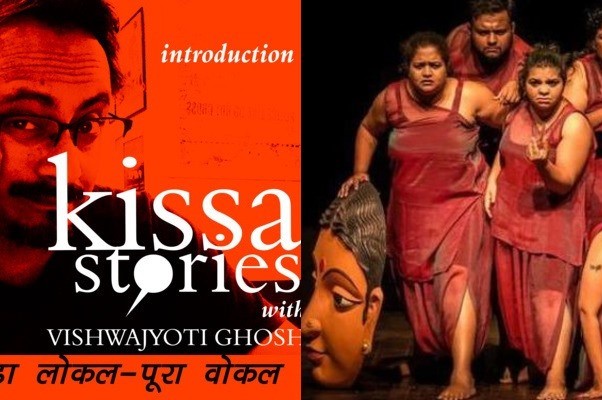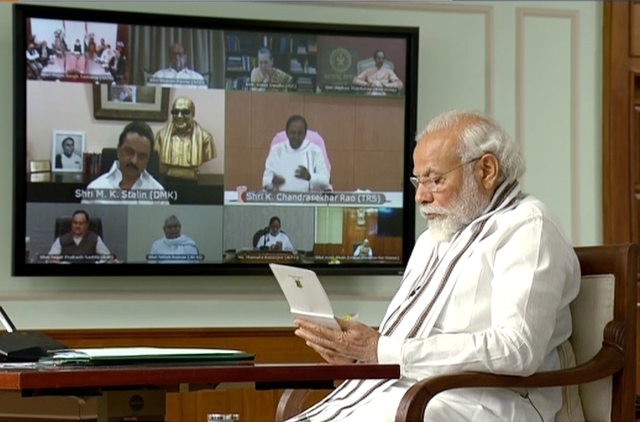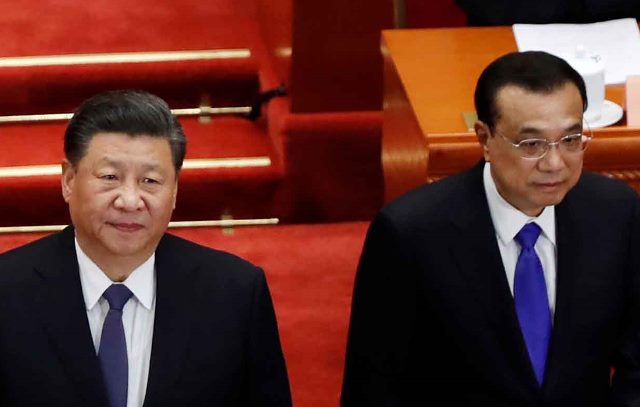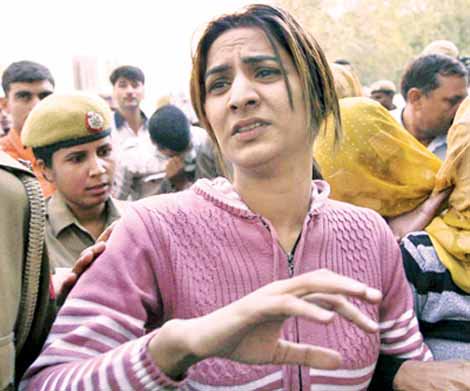The human will is insatiable, irrepressible and
difficult to defeat. Even in a lockdown, infinite quarantine with no definite
deadline or dateline, as in contemporary India, unfortunately, surrounded and
overwhelmed by dying, disease and tragedy, full of suppressed angst and anger
at the mindless repression on young people, students and academics, and an
80-plus great revolutionary poet, now inflicted with Covid-19, imprisoned in
jail for months in this heat and pandemic, ‘people’ just can’t allow themselves
to be defeated. This has been most reflected in the social media and also
outside, as people in India and elsewhere strive to find a life outside the
compulsory depression and ritualism of daily despair.
Editor-in-Chief of The Guardian of London, Katherine
Viner, in a seminal lecture six years ago, described the role of the journalist
in an overwhelming scenario of the flowering of the social media. She said:
“What if we were to embrace the ecosystem of the web and combined established
journalistic techniques with new ways of finding, telling and communicating
stories? Opened ourselves up? Put the people formerly known as the audience at
the heart of everything? Combined the elite and the street… and the tweet?”
Well, not everyone is tweeting in India, and not
everyone is a ‘citizen journalist’, and considering Indian population, only the
participants in the social media are microscopic, despite the kitschy Tik Tok,
a grassroots app involving millions in the most invisible bylane of our vast
countryside, now banned for ‘nationalist reasons’ despite their Rs 30 crore
donation to the inscrutable ‘PM Cares’.
And, yet, during this repressive and depressive lockdown, a new
flourishing culture of sound, visuals, text, art and craft, meaning and
meaninglessness, knowledge systems, film, literature, science and social
sciences, and critical commentary on politics, ecology and society has
flourished.
This is the new aesthetic of the new normal of the
post-truth society, a new folk and oral tradition, and it makes sense, and
could possibly signal the future of the cultural life of an online quarantined
generation post Covid-19 – because this pandemic, at least in India with its
crumbling health structure, is bound to stay for a long, long time.
So what should the people – thinkers, artists,
students, academics, ordinary citizens, even housewives, and now house-husbands
– do? They shall innovate and they will make the best out of it. Here’s how,
and this article only gives a few illustrations.
Vishwajyoti Ghosh is the author of a path-breaking
political graphic novel located in the turbulent India of the 1970s, in the
backdrop of the authoritarian imposition of the Emergency. His out-of-the box
book, among others, ‘Delhi Calm’, a visual journey of post cards, is a
brilliant narrative. So what is this young and restless soul doing, having quit
his job with a top publishing house recently, amidst mass unemployment?
Ghosh started a no-profit, no-money, fully
entertaining, and driven with black humour podcast with Spotify, called ‘Kissa
Stories’, with a catchy slogan: ‘Thora local, pura vocal’ (A bit local, a lot
of vocal). It is the rediscovery of sound, old radio, forgotten neon signs of
signature tunes, including from Bollywood, nostalgia of the 1970, a bit
political, a lot social, homely, replete with neighbourhood stories, clichés
rediscovered as sweet and bitter landmarks, and
the pure joy of living in those times in mofussil localities in Delhi.
Especially for a small-town guy who comes from the Hindi heartland and wants to
become a writer in the big city. So typically clichéd and so lovely, truly.
Chasing good
luck, finding bad luck, and many shared travellers of similar journeys,
‘Vishwa’ tells us in impeccable Hindi, the little stories of his youth with an
uncanny and spoofy political and social backdrop, so that history is neither
rewritten nor buried in ‘pseudo nationalism’. For instance, his Mamu comes from
Soviet Russia and brings a toy airplane for him. So he is the star of the
neighbourhood, and his Mamu becomes his missing dad. In a tea shop cum library
run by, who else but a Bengali revolutionary, on eternal ‘udhaar’, they
discover a new and creative language. When the Emergency comes, so, how do they
hide the books: Marx, Lenin, and Bhagat Singh?
On their dangerous night journey in a curfewed city,
to hide the books, the rendezvous becomes a Ramsay Brothers’ horror clip as
cops catch them. So a genius among them flashes out an ‘old joint from the
grassroots level’ story, and the cops are convinced that these young boys are
apolitical and harmless, simply going for a spin to Pahargunj to score ‘stuff’.
In the ‘Encounter’, the latest podcast, a clueless
middle-aged vice president of a corporate company is just not able to square up
with upstart, drop-out, young eclectic
geniuses who are now into millions with their the mad start-ups. Indeed,
listeners of this short revelation of nostalgia as fast-forward realism are now
going to contribute to the next episodes. They seem to be promising with their
tempting titles: ‘Gurgaon ka Romeo, Shimla ki Kulfi, Purani Dilli ke Purane
Kisse, Lucknow ki Barish, Kalkata ki Mausi, Manali ki Raate’, among others.
Said Vishwajyoti Ghosh to Lokmarg: “Kissa Stories’ is
made up of the stories we live, the kissas we make up beyond our lives, that
are even better than original, everyday. ‘Kissa Stories’ has emerged as a form
of micro-stories, of incidents, epiphanies and anecdotes. Emerging mostly from
conversations, or memories of conversations, the idea is to bring together a
varied collection of stories through people across the spectrum who are
separated by six stories of separation. The podcast is working with only
original content both from the audience and its podcaster.”
This podcast, with all the archival sounds and
atmospherics of radio, is available on all major platforms like Apple, Google,
Spotify. Free!
Young theatre person, Parshathy Nath of Thrissur in
Kerala, active performer across borders, felt that it was time to do something.
So with other friends she started a play-reading session online. It’s a
starting point for these talented people with unsurpassed energy. And they seem
to be crossing the threshold. Said Parshathy to Lokmarg: “The lockdown and the
uncertainty that followed put me into a confused state of mind like anyone
else. More because I am a performer and I was working with a theatre group in
Bangalore when lockdown was declared. Initially, it was a shock. There was also
anxiety. But, gradually, we had to ease into the new reality. In this regard,
all I could resort to was to the virtual space. Although, I still feel theatre
is about that live presence of the actor in flesh and blood before you, I had
to reach out to fellow artistes for some creative respite. Along with a few
artistes in Kerala, we got together on Google Hangouts to read a play. Just
practicing enunciation, observing beat changes and emoting, felt like catharsis
for me. I didn’t mind that we were reduced to square sizes on our laptops and
mobile screens. All that mattered was we kept the camaraderie of theatre going.
Just seeing my co-actor’s faces was a relief. I would thank technology for
bringing me a little closer to my tribe to vent out our woes, sing songs
together and rehearse our lines, even when the possibility of going on stage
felt so far away.”
Jazz, folk, blues, Spanish guitar, classical, Indian
and western, short films, amateur films with a hand camera, poetry and
recitations, stories and games of children, grandmothers’ tales, webinars,
monologues and discussions on current affairs, including hard topics like fake
encounters and Galwan Valley, long distance classical music and opera, old
paintings and old film posters, pictures of yesteryears like the premier of
Guru Dutt’s Kagaz ke Phool, biographies of great actors, filmmakers, singers
and musicians, and their songs and film clips,
including how to cope with depression
and mental health issues, and, of
course, political resistance, peacefully and non-violently, inspired by
archival icons: Che Guevara, Gandhi, Frida Kahlo, Charlie Chaplin, Lenin.
Every step in social media etc these days is a step
into archival and contemporary innovations, some brilliant some totally banal,
but that is life, isn’t it?
The icing on the cake has been a Cat Stevens’ new
song, sung with the old man oozing grace and lyricism. Also Martin Scorsese
giving lectures on filmmaking, starting with ‘Battleshop Potemkin’ of Sergie
Eisenstein and ‘Taxi Driver’ with Robert De Niro, as a teaser. That’s cool and
tempting too, but the hitch is that it costs a packet.
